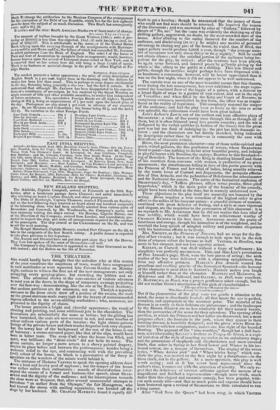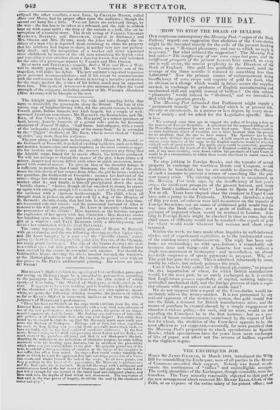THE THEATRES.
ONE would hardly have thought that the nobodies who at this season of the year constitute the emptiness of town, would have congregated in such multitudes as were squeezed into Covent Garden on Monday night, curious to witness the first act of the new management; not only Occupying every peeping-place, but crowding the lobbies and sa- loons. The attention shown to the convenience of visiters advances to meet you at the doors, in the shape of temporary awnings projecting over the foot-way ; demonstrating, like the one at the Royal Academy, that modern porticoes are for ornament, not use. Though a separate entrance to the dress circle drew off a portion of the swarm, the rush up the grand staircase made many sigh for the luxury of unincommoded ingress afforded to the seven-shilling seatholders ; who, moreover, are promoted to the dignity of chairs. The house presents a bright and cheerful appearance ; the result of cleaning and painting, and some additional jets to the chandelier. The decorations are substantially the same as before ; but the gilding has been burnished, the seats are new-covered in red, and some touches of colour enliven various parts of the interior : the light chintz-pattern linings of the private boxes and their scarlet draperies look very elegant ; but the tawny hue of the background of the rest of the house is out of harmony: a cream-coloured paper, like that of the slips, would have been in better taste. The coup-d'ceil when the house was filled, and quiet, was brilliant ; the "dress circle" did not belie its name. The greets curtain, no longer a mere screen to a showy painted drapery, retains its place before and between the performances : besides being a welcome relief to the eye, and contrasting well with the prevailing (red) colour of the house, its blank is a provocative of the fancy to speculate on the wonders of the mimic world behind it. The entrance of Madame VESTRIS to speak the opening address drew down a loud and hearty peal of applause ; but the temper of the house 'was rather sullen than enthusiastic : sounds of dissatisfaction inter- rupted the course of a formal and business-like speech, about SHAK- ETRE and the dignity of the audience ; and the interruptions towards the close were so frequent, that, after several unsuccessful attempts to Introduce "an author from the Olympic," the fair Manageress, who had braved the sterna with smiling equanimity, was banded tiff ithe Stage by her husband. Mr. CHARLES MATHEWS found it equally dif-
The curtain rose on one of the most beautiful scenes that this theatre, even during the late management, has ever exhibited the stage repre- sented the tesselated floor of the loggia of a palace, with a descent by a broad flight of steps to a garden of vast extent, laid out in the style of Versailles ; and when filled by the King and Court of Navarre, in sumptuous costumes, marshalled in due form, the effect was as magni- ficent as the reality of regal state. This completely restored the temper of the audience ; and had the play been as lively as the mise enscene was splendid, the enthusiasm would have been great indeed. Love's Labour's Lost is one of the earliest and least effective plays of SHAKSPERE: a vein of fine poetry runs through this as through all of them, but it is often frittered away into puerile conceits ; and the wit is disfigured by the verbal quibbles (a fashion of the times) that the great poet was but too fond of indulging in : the plot has little dramatic in- terest ; and the characters are but faintly sketched, being indicated by description rather than by action-as is commonly the case with first efforts of dramatic writers.
Biron, the most prominent character-one of those noble-spirited and quick-witted gallants, the fine gentlemen of nature, whom &ARMEE loved to paint-has nothing to do but utter beautiful poetry, and indulge in playful banter with Rosaline, the embryo Beatrice to this foreshadow- ing of Benediek. The humour of the King in shutting himself and three of his courtiers from converse with women, is productive of no great amusement ; the simultaneous falling in love of this paths quarrix with the Princess of France and her triad of ladies, being scantily relieved by the rustic loves of Costard and Jaquenetta, the pompous affecta- tion of Don Armed°, and the pedantries of Holofernes the schoolmaster and Sir Nathaniel the curate. The satire of the fantastical euphuism of SHAKSPERE'S day, " Taffeta phrases, silken terms precise, three-piled hyperboles," which is the main point of the humour of the comedy, might have been relished at the time, but is scarcely understood now. , These objections to the play itself are assuredly not lessened by the acting. Biron requires a true comedian of the highest order to give effect to the sallies of his buoyant nature ; a graceful airiness of manner, combined with great delicacy of feeling, and a style at once vigorous and elegant, are the requisites to the personation of this character: it is no reproach to Mr. ANDERSON that he did not realize this beau ideal of true nobility, which would have been an achievement worthy of CHARLES KE3IBLE in his best days. ANDERSON merits the praise of heartiness and energy, though his animation is of the weightiest, and he overlaid the long speech of mingled raillery and passionate eloquence with his boisterous efforts to be lively.
Mrs. NnsnErr, as the Princess of _Navarre, had no scope for the dis- play of her vivacity ; but it was enough to look upon her in the rich dress of crimson velvet she became so well VESTRIS, as Rosaline, was more in her element, and not less superbly attired.
KEELEY, as Costard, was droll without a tinge of buffoonery ; his simplicity was perfectly unconscious. This, and Miss LEE'S personation of Don Armado's page, Moth, were the best pieces of acting: the arch replies of the boy were delivered with a charming sprightliness, free from any offensive pertness. Hansairs Don Armado wanted the grandiose and swelling gravity of the fantastical Spaniard-the humour of the character is most akin to LISTON'S ; HARLEY makes you laugh at himself, rather than at the character. Banmte and MEADOWS, as Hokftrites and Si,' Nathaniel, and GRANDY, as Pull, were excellent. F. MATTHEWS; as Bonet, was a proper gentleman usher enough, but he did not realize Biron's description of this pink of chamberlains-
" The ape of form-Monsieur the nice- Who kissed away his hand in courtesy."
But if the pleasantries of the play were too gentle a stimulus to the mind, the sense is abundantly feasted ; all that meets the eye is perfect, complete, and appropriate to the minutest point. The material of the dresses is as costly as their fashions are picturesque ; and the landscapes by the Messrs. GRIEVE are no less admirable for their natural beauty, than the accessories of tine scene for their splendour. The opening of the pavilions, in which the Princess and her ladies are discovered, has a most gorgeous effect; the fountain in the park, where they appear in their hunting-dresses, is tastefully designed ; and the grove where Biron de- tects his love-stricken companions, intakes one lose sight of the boarded flooring. The pageant of the "nine worthies," though but a dull busi- ness, notwithstanding KEELEy's drollery as Pompey the Great, is a capi- tal imitation of the style of enacting mysteries on an ambulatory stage ; and the processions of shepherds and shepherdesses and snow-covered hinds, that usher in Spring in her floral bower and Winter in his ice- bound retreat, are a masque of themselves. The singing of the sweet lyrics, " When daisies pied" and " When icicles hang," which con- clude the play, was marred on the first night by a disturbance-in the dress circle, not in the gallery. As a mere spectacle, this play is well worth seeing ; and as it has never been represented since the author's time, it comes out with the attraction of novelty. We only re- gret that the deficiency of interest militates against the success of so magnificent and finished a representation-though mere trash, much duller than this elegant and romantic comedy, has been popular, with- out such scenic aids-and that so much 'pains and expense should have been bestowed upon a revival of SHAKSPEDE so little calculated to run, a long career.
After "Cod Save the Queen" had been sung, inn which VESTRIS ficult to get a hearing; though he arinouneed that the money of those who could not find seats should be returned. He inquired the reason of the discontent; and was answered by cries of "Gallery," followed by shouts of" No, no!" but the cause was evidently the shutilng-up of the shilling gallery, aggravated, no doubt, by the over-crowded state of the house. After alluding to the outlay incurred for the comfort of the audience, and disclaiming (as tray he might) any motive of personal advantage in closing any par; of the house, he stated. that, if filled, the upper gallery would produce 3,0001. a year, though "the average num- ber of occupants was only about thin ty or forLy nightly." Still he could not obtain silence ; and the satisfied portion of the audience being im- patient for the play, he retired : after the overture had be.en played, he again came forward, and insured pet.ce by gallantly giving up the whole o2 the -nllery to the public at a shilling. This was liberal and politic, though the sacrifice might perhaps have been dispensed with so handsome a concession, however, will be better appreciated than it was on the first night, when it did not appear to be well understood. .;
eelipsed the other vocalists, a new farce, by CHARLES DANCE, called Alive and Merry, had its proper effect upon the audience ; though the second act hung fire a little. Two-act farces are awkward things, by the way : the fun has to be taken at a rebound, and the ball is seldom kept up with equal spirit ; the drop of the curtain is a jerk, like an in- terruption of a comical story. The lively acting of PARREN, CHARLES MATHEWS, BARTLEY, and BROUGHAM, (capital in Irishmen,) and Mrs. ORGER and Mrs. Humpy, made the jokes tell : though the in- cident of a man who is reporteff dead, returning to claim his property that his relations had begun to share, is neither very new nor particu- larly droll ; and the recognition of a brother and sister separated since childhood, by means of the old man mimicking his boyish voice and repeating a conversation about a dancing-lesson, was only tolerated tbr the sake of a grotesque minuet by Vanaux and Mrs. Onotm. BEAUMONT and FLETcumes comedy. Ride a IIVe and Hare a IT will be shortly produced, in which Mr. 0. VANGENHOFF, son of the tragedian, will make his debk. The new aspirant is reported to possess great personal recommendations ; and if his talent be commensurate with the enthusiasm that he has shown in leaving a lucrative profession for the stage, against the wishes of his father, much may be expected front him. The opera of Artaxerxes is also announced; when the vocal strength of the company, including another of Mr. WELSH'S ..ThHilianeS (Miss AUSTIN) will be brought to the test.



























 Previous page
Previous page